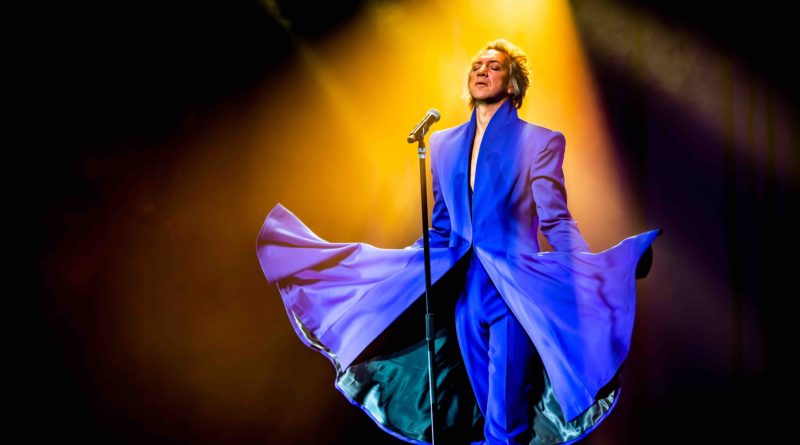INTERVIEW: LaMaMa cabaret show pays tribute to David Bowie
Photo: Where Are We Now stars Sven Raztke, who channels the musical creativity of David Bowie. Photo courtesy of Hanneke Wetzer / Provided by DARR Publicity with permission.
David Bowie was an iconoclast who had no equal in the music industry. The musician crafted some of the legendary classics of the last 50 years, everything from “Space Oddity” to “Golden Years” to “Under Pressure.” He was an original, a beloved favorite who seemed to relish his creative position on the outside of the world.
Celebrated cabaret singer Sven Ratzke will soon offer an unparalleled interpretation of Bowie’s best songs at an intimate concert experience at the East Village’s LaMaMa. The singer will be joined by pianist Christian Pabst, and the evening is directed by Dirk Groeneveld.
Performances, which run Dec. 11-21, will find Bowie’s music stripped down for a small venue where there’s a spotlight, a piano and a microphone. It’s up to Ratzke to transport audience members away to another world, where they can enjoy life on Mars, anticipate the changes and ask Where Are We Now, which is also the name of the show.
Recently Hollywood Soapbox exchanged emails with Ratzke, an entertainer who has played Lincoln Center, Concertgebouw Amsterdam, Bertolt Brecht’s Berliner Ensemble in Berlin, the Sydney Opera House and Arts Center Melbourne, according to press notes. He has also appeared as the title role in Hedwig and the Angry Inch and received raves from the show’s creator, John Cameron Mitchell. Questions and answers have been slightly edited for style.
When did you first fall in love with David Bowie’s music?
There’s a first and a second falling in love. My first falling in love, I tell this story also in my show, was when I was completely intrigued as a teenager by this cool man, in these suits, and these two colored eyes and this low sexy voice. This was the Let’s Dance period. I was intrigued, but at the time I also knew it was a bit cheesy. Later on I discovered all this work that he had done, all these styles, characters. I fell in love with this almost epic scale of work and art he created. All is connected. It’s always new; it’s always an adventure. And it’s theatre.
What can audience members expect from this evening of cabaret?
Well, after creating the show Starman in 2015, which was a wild trip into ’70s Bowie, with a band and the stories, it was like a wild lsd trip. Back then we got the personal permission to make this show, but then in the middle of the tour he passed away. It was a shock that I couldn’t comprehend at the time, but I knew I had to continue, but in a different way. So Where Are We Now reflects on this time [we’re] living in — a time without Bowie.
But also Bowie will be always here, because of his music. His music is like his inner voice. In this show you hear the music maybe like you never heard it before, more intimate, in new arrangements, only a piano and a voice. And there are these stories that I tell, taking you on a trip between fantasy and reality. Most of them are true though. So it’s rock ‘n’ roll, ballads, poetry and very entertaining stories.
Are there unique challenges and opportunities of presenting this style of music in a more intimate setting?
Yes, every word is heard more clearly. The meaning of the songs becomes clearer to many. In London, or Berlin, the audience was in tears. ‘Cause suddenly you connect with the songs even more. I was always in love with the piano. I think it’s the most universal instrument. There’s a full orchestra, a whole world in that little wooden black box. I love when it comes down to withdraw all other things, and come to the core of a song, words and music.
Do you believe that by going more intimate with his songs the audience is able to discover even more about the tunes?
Yes, absolutely. It’s a totally different color. The influences of jazz and classical, minimal music suddenly shows even more. I approach a song as a story, as a little mini theatre play. And Bowie is above all a storyteller. He even brings some characters back after 10 years in a different song, like Major Tom. I think by making the setting, the songs so intimate, people can connect even more with the content of the work of Bowie. It becomes even more personal.
What’s it like working with pianist Christian Pabst?
This is a great brotherhood and inspirational cooperation. Christian studies jazz and film compositions. So he’s free; he can improvise. But he also has a classical knowledge, and he can take on atmosphere very easy. Not everyone gets my world, my images, but he does: we both are thinking in images and translate that to music.
What was your initial reaction when you heard news that David Bowie died?
I think I was in shock, like the rest of the world. It was really hard, ’cause we were in the middle of the tour of Starman, so I had to sing his songs every night. I had to continue. But what kept me going was the thought that I also brought comfort to many — and joy. I had sometimes the feeling that he was watching us. That he was nodding his head, like, yeah, just do it. Sing it. Tell it. I knew it was always his wish that other artists would sing his music, that his music would live on, his stories. And I hope we do him justice.
By John Soltes / Publisher / John@HollywoodSoapbox.com
Where Are We Now, conceived and performed by Sven Ratzke, will play Dec. 11-21 at LaMaMa Downstairs Theatre on East 4th Street in New York City. Click here for more information and tickets.

